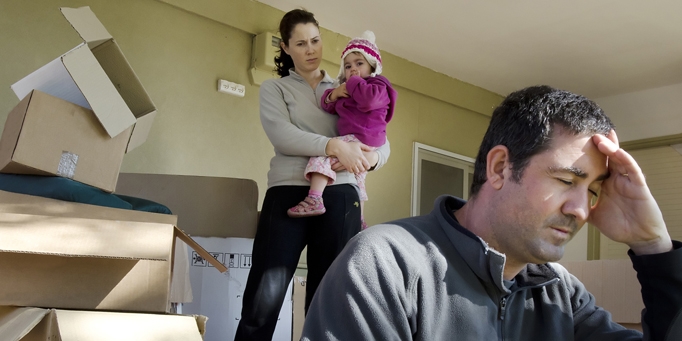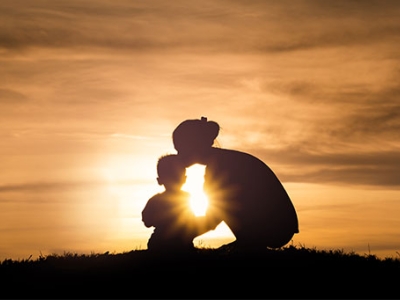
Against despair: parenting help from the book of Ruth
Chapter 1 is only the beginning.
At the start of the book of Ruth, we meet Naomi, an Israelite mother who has spent ten years living as a foreigner in Moab. Her family moved there to escape a famine in Israel. In Moab, though, tragedy struck: first Naomi’s husband and then her two adult sons passed away. Now the famine has ended, and Naomi decides to leave Moab and head back to her home town of Bethlehem. Imagine the pain she feels. Her husband and sons are dead, all her hopes and dreams are shattered, and she believes that God is against her. In fact, when she gets home, she asks people not to call her Naomi, which means ‘my delight’, but rather to call her Mara, which means ‘bitter’. She tells the group of women crowding around her:
‘for the Almighty has made me very bitter. I went away full, but the LORD has brought me back empty. Why do you call me Naomi, since the LORD has opposed me, and the Almighty has afflicted me?’ (CSB)
It would be easy to stand at a distance and condemn Naomi for her impiety and lack of faith. There are, however, so many moments in life and parenting where we can feel like life has become very bitter. The moments of teary-eyed joy when you hold your newborn baby in your arms are later tempered by all sorts of trials. These can include a short- or long-term illness, sleeplessness, your child being bullied, cutting themselves, having an eating disorder or suicidal ideation or running away, an unplanned pregnancy, abuse by a loved one, neurodiversity, confusion about how to discipline, how to introduce technology, what to give them to eat, why they won't talk to you about something, having them swear or yell at you, you losing your temper at them, money issues, schooling issues … the list goes on. Worst of all, they may give up on Christ. In these moments and months and years, why should we not despair?
When we look at the story of Naomi, we can very easily see something that she cannot see. That is, at her moment of greatest despair, she is only in chapter one of the story. In her despair she makes a number of assumptions. She assumes that God is against her, that she has returned to Bethlehem empty, that her daughter-in-law will never find a husband in Bethlehem and that she, Naomi, will never have any more children. Over the next three chapters, all of these assumptions turn out to be wrong. Naomi returned to Bethlehem with Ruth (one of the best daughters-in-law in history) and at a time of abundant harvest. God guides Ruth to Boaz, a man of noble character who cares for her and Naomi the way that God had instructed a family redeemer to do. Ruth marries Boaz and they have a child, who is placed in Naomi's arms and declared to be her child. By chapter 4, God has blessed her abundantly.
This is not to say, don't panic when bad things happen because it’s all about to get better in the next few weeks. The book of Ruth does tell us, though, that there is a bigger picture beyond what we can see in our current situation. What seems like a short book about God's kindness to Naomi, Ruth and Boaz, is actually a piece in a much bigger story. The book ends by telling us that Ruth and Boaz's son is Obed, who fathers Jesse, who fathers King David. God has used this small family in a small village to bring about the great king of the Old Testament to whom all other kings are compared.
As Christians, we know that even this is not the end of the story. Through Boaz and Ruth and King David, Jesus is born in the same town that they called home. Even as God had been working in a tiny way with a tiny family, he had also been working through them to bring about his mighty plans of salvation and blessing to the world. Jesus himself would go on to experience the pain of life in a fallen world and ultimately drink the ‘bitter cup’ of death for us. He would become our family redeemer, buying our forgiveness and freedom from slavery to sin with his own blood. Just like Naomi and Ruth came under Boaz’s wing of protection and care, we now come under the protection and care of the much mightier Jesus. He has given us the right to be children of God, able to call on our Father in Heaven at all times (Romans 8:15–16). We have his Holy Spirit living within us, speaking to God with groans that words cannot express (Romans 8:26–27). We also know that, even now, the story is not over. We know that the story will end with evil destroyed, and more people than we can count praising God at the foot of his throne for all eternity with joy and thankfulness.
Sad things are sad, and we should treat them as sad. Hard things are hard, and we should treat them as hard. We should not, however, be so overwhelmed by them that we end up in bitter despair. We need to remember that however bad things seem in the moment, the story is not over. We do not know if we are in chapter one or ten or a hundred, but we do know that, while things are bad, we are not in the last chapter. Our faithful God never loses sight of his wonderful plans and he never loses control. He has told us that this life is hard, but he has also said that he is always with us and that he is working to bring all things under Christ (Matthew 28:20; Ephesians 1:10). As you deal with each day, trust in this faithful God.
If you’d like to hear more encouragement from the book of Ruth, you can listen to my podcast episodes 29 and 30.
---
Dave is married to Janice and they have four kids. Dave has been a minister, teacher, school chaplain and now hosts Stories of a Faithful God and Stories of a Faithful God for Kids. His podcast website is faithfulgod.net. Dave and his wife Janice are the authors of An Arrival to Celebrate: Fun Advent devotions for busy families unwrapping God’s big Bible plan.

Ruth - A God Worth Clinging To
Coupled with unique free downloadable slideshows, these four studies on the book of Ruth explore the ongoing, deeply personal, work of an extraordinary God in the lives of ordinary people.
For more articles from Growing Faith, subscribe to our monthly e-newsletter.
To hear about the latest books and resources from Youthworks Media, subscribe here.








